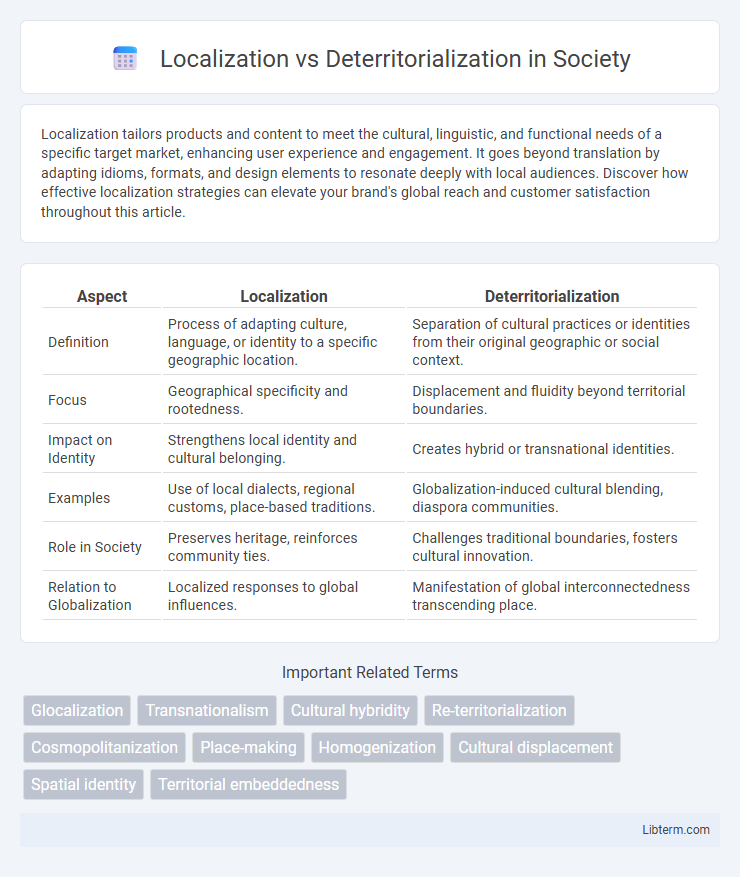Localization tailors products and content to meet the cultural, linguistic, and functional needs of a specific target market, enhancing user experience and engagement. It goes beyond translation by adapting idioms, formats, and design elements to resonate deeply with local audiences. Discover how effective localization strategies can elevate your brand's global reach and customer satisfaction throughout this article.
Table of Comparison
| Aspect | Localization | Deterritorialization |
|---|---|---|
| Definition | Process of adapting culture, language, or identity to a specific geographic location. | Separation of cultural practices or identities from their original geographic or social context. |
| Focus | Geographical specificity and rootedness. | Displacement and fluidity beyond territorial boundaries. |
| Impact on Identity | Strengthens local identity and cultural belonging. | Creates hybrid or transnational identities. |
| Examples | Use of local dialects, regional customs, place-based traditions. | Globalization-induced cultural blending, diaspora communities. |
| Role in Society | Preserves heritage, reinforces community ties. | Challenges traditional boundaries, fosters cultural innovation. |
| Relation to Globalization | Localized responses to global influences. | Manifestation of global interconnectedness transcending place. |
Understanding Localization: A Conceptual Overview
Localization refers to the process by which global products, services, or cultural practices are adapted to fit the specific preferences, languages, and contexts of a particular geographic region or community. This involves tailoring content and interactions to resonate deeply with local audiences, ensuring relevance and accessibility. Understanding localization highlights its role in fostering cultural identity and economic participation within localized spaces, contrasting with deterritorialization's emphasis on transcending physical boundaries.
Defining Deterritorialization in a Global Context
Deterritorialization refers to the process by which cultural, social, and economic activities transcend traditional geographic and political boundaries, leading to the weakening of ties between culture and place. In a global context, it highlights the fluidity of identities and practices as globalization, digital communication, and migration blur national borders and local affiliations. This phenomenon challenges the conventional concept of localization by emphasizing movement, disembedding, and the reconfiguration of social relations beyond territorial constraints.
Historical Roots: From Local to Global
Localization traces back to historical practices where communities established distinct cultural identities rooted in specific geographic locations, shaping traditions and social structures over centuries. Deterritorialization emerged with globalization, challenging fixed boundaries by enabling cultural flows and exchanges that transcend local territories through technology and migration. This shift from localized identities to global interconnectedness highlights the transformation of spatial and social experiences in the modern era.
Core Differences Between Localization and Deterritorialization
Localization emphasizes the anchoring of cultural, economic, or social practices within specific geographical or territorial boundaries, reinforcing a sense of place and local identity. Deterritorialization refers to the process by which these practices, identities, or relationships become disengaged from their original physical or cultural contexts, often through globalization, digital networks, or transnational flows. The core difference lies in localization affirming territorial ties, while deterritorialization challenges or transcends these ties, leading to fluid, borderless forms of connection and identity.
Impacts on Culture and Identity
Localization reinforces cultural identity by emphasizing specific geographic, linguistic, and social contexts that shape traditions and collective memories. Deterritorialization transforms cultural expressions by detaching them from original locales, leading to hybrid identities and dynamic cultural exchanges that challenge fixed notions of belonging. The tension between these processes influences globalization's impact on cultural preservation and the evolution of personal and communal identities.
Economic Implications of Localization and Deterritorialization
Localization drives economic growth through concentrated regional development, enhancing local supply chains and fostering specialized labor markets that increase productivity and innovation. Deterritorialization disrupts traditional economic boundaries, enabling global value chains that reduce dependency on specific geographic areas and promote cross-border trade and investment. The interplay between these concepts reshapes economic landscapes by balancing the benefits of localized expertise with the flexibility and scalability of globalized networks.
The Role of Technology in Shaping Boundaries
Technology redefines spatial boundaries by enabling localization through precise geotagging and real-time data analytics, enhancing place-based interactions and cultural identity reinforcement. Conversely, deterritorialization occurs as digital platforms and virtual networks dissolve traditional geographic constraints, fostering global connectivity and fluid exchange of ideas beyond physical borders. The interplay between localization and deterritorialization reflects technology's dual capacity to both anchor experiences to specific locales and transcend territorial limitations in shaping social, economic, and cultural landscapes.
Real-World Examples and Case Studies
Localization refers to adapting products or services to meet the cultural, linguistic, and regulatory requirements of specific markets, as demonstrated by Netflix's tailored content libraries and subtitles for different countries. Deterritorialization involves breaking traditional geographic and cultural boundaries, evident in the global success of K-pop, which transcends South Korean origins through digital platforms and international fanbases. Case studies such as Airbnb highlight localization by customizing offerings to local laws and customs, while deterritorialization is seen in cryptocurrencies like Bitcoin, operating independently of national borders.
Challenges and Opportunities in a Globalized World
Localization faces challenges such as maintaining cultural identity and adapting products to diverse markets while navigating regulatory differences and supply chain complexities. Deterritorialization offers opportunities for expanding reach and fostering cross-cultural exchanges but complicates governance, accountability, and preservation of local traditions. Balancing these factors in a globalized world demands innovative strategies to leverage global connectivity without eroding local uniqueness.
Future Outlook: Balancing the Local and the Global
The future outlook of localization versus deterritorialization emphasizes a dynamic balance between preserving cultural specificity and embracing global interconnectedness, driven by advancements in digital technology and cross-border collaboration. Emerging trends highlight the importance of context-aware platforms that tailor global content to local languages, customs, and regulations, fostering inclusive and adaptive experiences. Strategic integration of localized knowledge with deterritorialized networks will shape resilient economies and sociocultural ecosystems in an increasingly hybridized world.
Localization Infographic

 libterm.com
libterm.com